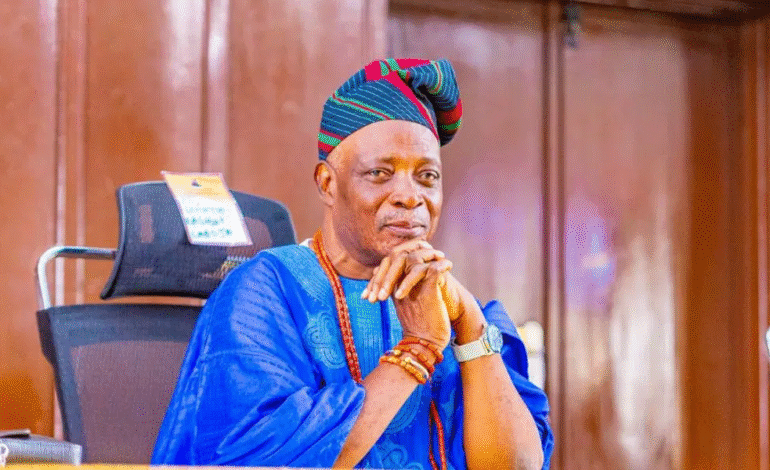Ahead of the coronation of the 44th Olubadan of Ibadanland, Oba Rashidi Ladoja, on Friday, September 26, 2025, the Oyo State Government has expressed readiness to host the historic event.
Also, security in the town had been strengthened ahead of the expected arrival of President Bola Tinubu and other important dignitaries.
On Wednesday, the advance team of the President arrived in Ibadan from the Federal Capital Territory, Abuja, in preparation for the event.
A senior security personnel, who did not want his name in print, told The PUNCH in Ibadan, “We are not here to play. We want decorum.
“If you are not invited, why can’t you look for somewhere else to enjoy the programme through available television or radio stations.
“Even if you are my friend or friends, stay clear of Mapo if you don’t have anything to do there.”
Ahead of his installation, Oba Ladoja, on Tuesday night, began traditional rites and remained in seclusion.
He will mark his 81st birthday today in seclusion, though activities were lined up across the town to celebrate the monarch.
Ladoja, who would receive both the staff of office and instrument of office on Friday, September 26, succeeds Oba Owolabi Olakulehin, who joined his ancestors on Monday, July 7, 2025, at the age of 90 years.
Mapo wears new look
The venue of the coronation, the historic Mapo Hall, started wearing a new look on Wednesday, as painting and cleaning up of the environment were ongoing.
The venue is the ceremonial coronation venue for Ibadan monarchs through the ages.
Successive Olubadans in history have been presented with the staff of office amid pomps at the Mapo Hall, after their crowning and traditional rites at the Oluwo palace in Oja’ba.
A visit to the Obafemi Awolowo Stadium, Ring Road, revealed ongoing preparations to receive and entertain important guests.
The venue is now fully set to host dignitaries arriving in Ibadan to celebrate the new monarch.
Ibadan airport opens
The Samuel Ladoke Akintola Airport, Ibadan, which was shut down for an upgrade to international standards in March 2025, reopened for two weeks in honour of the new Olubadan.
The remodelled airport received its first aircraft at 9:14 am on Wednesday, when the presidential advance team arrived for the Olubadan coronation..
A statement by the Oyo State Government, signed by the Special Adviser to the Governor on Media and Communication, Sulaimon Olanrewaju, said the successful landing underscored the readiness and capabilities of the airport’s infrastructure to handle high-profile flights safely and efficiently.
With the presidential flight scheduled to follow soon, the inaugural flight set a positive precedent for future arrivals and departures at the remodelled airport.
Hotels fully booked
Hotels across Ibadan witnessed a surge in patronage on Wednesday, as visitors trooped into the city ahead of Friday’s historic coronation.
Many facilities around the venue of the event, particularly in Ring Road, Mokola, Sango, Secretariat, Ikolaba, and Bodija, were fully booked, with guests arriving from within and outside the state.
The influx of dignitaries, traditional rulers, government officials, and tourists has turned the city into a beehive of activity.
Falola urges balance between tradition, modernity
Renowned Ibadan-born historian, Prof Toyin Falola, on Wednesday, urged Ibadan leaders to carefully balance their cherished traditions with the pressing demands of modern development.
He gave the advice in his coronation lecture delivered ahead of the coronation.
The lecture, titled “Ibadan in History: Issues in Tradition and Modernity,” was held at the International Conference Centre, University of Ibadan.
The programme was part of a week-long activity preceding the main coronation ceremony on Friday.
In his presentation, Falola highlighted Ibadan’s central role in Nigeria and Africa’s history.
He said, “Ibadan has always been a cultural epicentre. In the 19th century, it was the largest city in sub-Saharan Africa and a hub for politics, trade, and military power. It was also the center of palm oil production, exported to Europe.”
Falola said Ibadan’s traditions remained visible in everyday life.
“The past is still with us in the amala we eat, the language we speak, the clothes we wear, and our performances. These remind us that Ibadan is not only a city of history but also a city of the future,” he said.
On the significance of Ladoja ascending the throne, the historian stressed that Ibadan would benefit greatly from the monarch’s political and administrative experience.
“Having a former governor and senator as Olubadan is significant. His exposure as a politician, statesman, and administrator will guide Ibadan toward modernisation.































